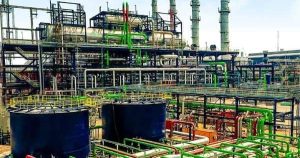
The federal government has every right to be in a buoyant mood; after several years of neglect, depressing commentaries, unbelief and cynicism fueled by failed promises, the nation’s four moribund refineries are Port Harcourt on the cusp of astonishing transformation.
This significant revival mirrors the power of unrelenting vision, unwavering commitment and undiluted driven by passion for a higher purpose. When the old Port Harcourt refinery resumed production on November 26, 2024, after extensive rehabilitation, the unfortunate attempt to weaponize and turn this landmark achievement into a political football stirred avoidable controversy that seemed to undermine its significance. Fortunately, while the doubting Thomases had their day, the impact of the revamp as a significant step in the country’s quest for energy security and concerted effort to reduce over reliance on imported refined products was not lost on well meaning Nigerians. Those who thought that the Port Harcourt refinery revamp was a flash in the pan were in for a rude shock.
Few days to the end of 2024, Mele Kyari, the intrepid head of the NNPC, the renaissance man at the centre of a silent revolution within the country’s energy sector delivered another powerful message to Nigerians. In company of regulators, journalists and government officials, he informed the nation that the Warri Refining & Petrochemicals Company (WRPC), situated in Ekpan, Uwvie and Ubeji areas of Warri has been revamped and was ready for business. The Warri Petrochemical plant, established in 1978, has an annual production capacity of 13,000 metric tons of Polypropylene and 18,000 metric tons of carbon black; it was built to cater to the markets in the Southern and South Western markets of the country. Composed of three stages, the Mele Kyari led NNPC, through its technical partners have started Stage One also called Area 1 which is able to produce AGO (diesel), Kerosene, Naphtha and others. These brands are required for both domestic and industrial use in the country. Shortly, the other plants that will produce Premium Motor Spirit (petrol) will commence production. The Kaduna refinery currently under rehabilitation will soon become operational.
Collectively, Kyari’s footprints in the upstream and downstream sectors of the energy sector, especially his determination to revamp the four state owned refineries with a combined capacity of 445,000 bpd underscores a huge leap in the country’s quest for energy security.
Decades of neglect, damage and accusations of mismanagement had held the realization of this lofty aspiration in abeyance and inflicted pain on Nigerians. As the mainstay of the economy, there was little or no doubt that continuation on this unenviable trajectory would further imperil the economy and plunge it into further atrophy. Mele Kyari mounted the saddle as the 19th Group Managing Director of NNPC in July 2019 with the determination to cleanse the Augean stable.
He came to office bristling with ideas on how to engineer what would become the most ambitious reform in the history of the corporation. There was simply no other way to confront the huge task he had set for himself; Nigerians were simply tired and frustrated about the endless revelations of sleaze and alleged mismanagement of the country’s cash cow and to have conducted the business of running the affairs of the corporation as usual would have assured for him, a prominent place in the hall of infamy.
Before Mele Kyari assumed office, almost on daily basis, Nigerians were treated to salacious commentaries detailing administrative lethargy and financial mismanagement of the corporation. The rot, administrative lethargy and alleged systemic corruption culminated in statutory infractions and the abdication of its responsibilities as the corporation began to fail in the fulfilment of its obligations on several fronts; it began to even falter in its remittances to the national treasury.
The uncomplimentary stories which read like a parchment of corruption and scroll of iniquities tarnished the image of the corporation. An audited account of the corporation in 2011 discovered that it could not account for about N28. 5 billion on subsidy related claims; in 2014, Emir Lamido Sanusi the current Emir of Kano raised alarm that a staggering $20bn was missing in the account of NNPC. He spoke in his capacity as the Governor of the Central Bank of Nigeria. In March 2016, the Auditor-General of the Federation alleged that the corporation failed to remit about $16bn to the federation account. The avalanche of allegations must have weighed heavily on the mind of Kyari as he took over the mantle of leadership in the beleaguered oil behemoth.
Peoplesmind
